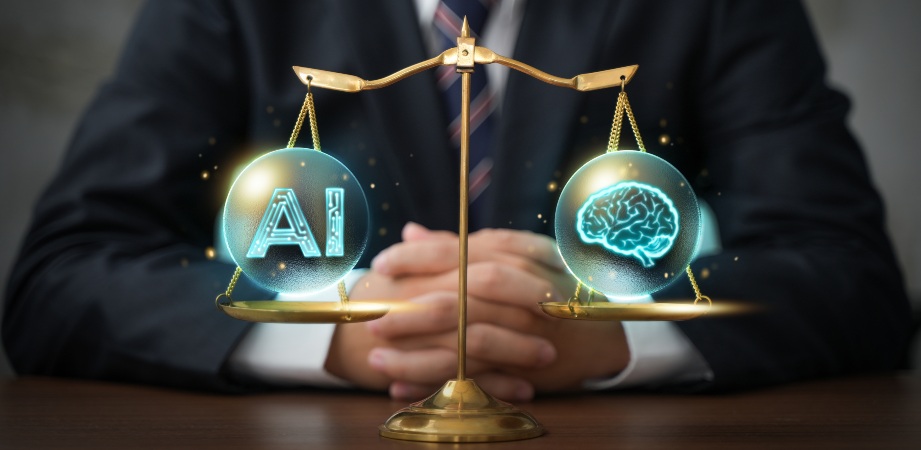
AI is finding its way into every industry from transportation management systems to surgery, and as artificial intelligence continues to advance, even the legal profession will see significant changes. 2025 is expected to see wider adoption of AI in law firms, offering new opportunities for efficiency while also prompting important discussions about ethical and responsible use.
From mundane tasks to complex legal analysis, AI is set to redefine how lawyers work, interact with clients, and even market their services. Let’s explore some key predictions for the year ahead and emphasize the importance of a cautious, informed approach to AI integration.
AI in Day-to-Day Legal Tasks
AI’s most immediate impact will be felt in streamlining routine tasks that have traditionally consumed countless hours for lawyers and legal staff.
Document Review and Analysis
Bid farewell to those grueling hours spent poring over contracts and legal documents. AI-powered tools are stepping in to revolutionize document review. These tools can swiftly sift through massive volumes of text, extracting crucial clauses, identifying potential risks or inconsistencies, and even summarizing key points. Imagine the time saved when AI handles the initial legwork, freeing up attorneys to focus on high-level analysis, strategy development, and client interaction.
Legal Research
Legal research, while essential, can be a time-consuming and laborious task. AI is poised to transform this process. AI-powered research tools can rapidly scan through vast databases of case law, statutes, and regulations, pinpointing relevant precedents and providing valuable insights in a fraction of the time it would take a human researcher.
Predictive Analytics
AI’s data analysis capabilities extend beyond simple document review. By analyzing historical case data and outcomes, AI algorithms can assist lawyers in assessing the potential success of a case, identifying potential risks, and formulating more informed and strategic approaches. This predictive power empowers attorneys to make data-driven decisions, potentially leading to better outcomes for their clients.
Document Generation
The drafting of routine legal documents like contracts, pleadings, and briefs can be a tedious but necessary part of legal practice. AI-powered tools can automate much of this process, generating standardized documents based on specific parameters and data inputs. This not only saves time but also reduces the risk of errors and inconsistencies, allowing attorneys to focus their energy on more complex and nuanced legal issues.
These examples showcase just a glimpse of how AI is set to transform day-to-day legal work. By embracing these technologies and integrating them strategically into their workflows, law firms can unlock new levels of efficiency and productivity, ultimately benefiting both their clients and their bottom line.
AI in Marketing and Client Acquisition
Beyond boosting efficiency within the firm, AI is set to revolutionize the way law firms attract and engage with potential clients. Here’s how AI is set to reshape marketing and client acquisition in 2025:
Personalized Client Communication
Say goodbye to missed calls and delayed responses. AI-powered chatbots and virtual assistants can provide instant support to potential clients, answering frequently asked questions, offering basic information about your services, and even scheduling consultations. This not only enhances client experience but also frees up your valuable staff to focus on more complex tasks and billable hours.
AI as a Creative Assistant
AI tools can now assist in generating content, from blog posts and website copy to social media updates and email newsletters. While human oversight remains essential for ensuring accuracy and originality, AI can help create outlines, suggest relevant topics, and even help overcome writer’s block.
Read More: Should I Use AI for My Law Firm Website Content?
Social Media Management
Keeping up with social media can be a full-time job in itself. AI can streamline social media monitoring, track brand mentions, and even suggest relevant content to share with your followers. This helps you stay engaged with your audience, build relationships, and foster a strong online community without dedicating excessive hours to manual social media management.

Navigating the Ethical and Practical Considerations
While the potential benefits of AI in law firms are undeniable, responsible and thoughtful implementation is crucial. AI, despite its rapid advancement, is still a developing technology. It’s essential to be aware of the potential pitfalls and ensure your firm’s AI usage aligns with ethical and legal standards.
Accuracy and Reliability: The Human Check
AI tools are powerful, but they’re not infallible. Errors, biases, and inaccuracies can inadvertently creep into the system. As a legal professional, your duty to your clients demands diligence. Always double-check and verify any information generated by AI tools, especially when it involves sensitive client data or critical case details. The human touch remains an indispensable safeguard in ensuring accuracy and reliability.
Data Privacy and Security: Client Confidentiality is Paramount
Law firms handle some of the most sensitive and confidential information imaginable. When adopting AI tools, it’s imperative to prioritize data privacy and security. Choose providers with robust security measures and ensure that their practices align with all relevant data protection regulations. Implement strict protocols within your firm to safeguard client confidentiality and protect against any potential data breaches.
Transparency and Client Communication: Openness Builds Trust
Transparency is key when it comes to AI adoption in law firms. Be open and honest with clients about how you’re utilizing AI tools, particularly when they directly impact their legal matters. Explain the benefits of AI while also acknowledging its limitations. Fostering open communication builds trust and ensures clients are comfortable with the role technology plays in their representation.
Maintaining the Human Touch: AI as a Tool, Not a Replacement
While AI can streamline processes and increase efficiency, it should never replace the human connection that’s so vital in the legal profession. Clients seek empathy, understanding, and personalized attention. AI can be a powerful tool, but it’s crucial to maintain a human touch in your interactions with clients, offering the guidance, support, and compassion they deserve.
Staying Informed: Navigating the Evolving AI Landscape
The legal and ethical landscape surrounding AI is in constant flux. New regulations, guidelines, and best practices emerge regularly. Make it a priority to stay informed about these developments and ensure your firm’s AI usage remains compliant and ethically sound.
Is Google AI Overview Good for Law Firms?
Civille: Empowering Law Firms in the Digital Age
While AI continues to evolve and offers potential for increased efficiency, we understand that a law firm’s core focus remains on providing exceptional legal services and building strong client relationships. At Civille, we specialize in crafting powerful digital strategies that help your firm thrive online. From expertly designed websites that showcase your expertise to targeted content marketing and effective PPC campaigns, we help you connect with the right clients and grow your practice.
The legal landscape is rapidly evolving, and embracing technology is essential for any firm that wants to stay ahead. While AI undoubtedly has a role to play, the human element of legal practice remains paramount. By partnering with Civille, you can focus on what you do best—providing exceptional legal services—while we equip you with the digital tools and strategies to thrive in the modern world.
Contact the Civille Team today to learn how our services can help you drive success at your law firm!





